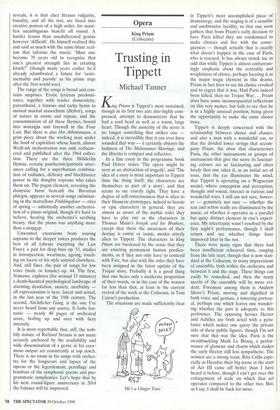Opera
King Priam (Coliseum)
Trusting in Tippett
Michael Tanner
Kng Priam is Tippett's most sustained, though in its first two acts also highly com- pressed, attempt to demonstrate that he had a cool head as well as a warm, large heart. Though the austerity of the score is no longer something that strikes one indeed, it is incredible that it can ever have sounded that way — it certainly abjures the lushness of The Midsummer Maniage, and the libretto is compact and reflective.
In a fine essay in the programme book Paul Driver states 'The opera might be seen as an abstraction of tragedy', and 'The idea of a story is more important to Tippett than the thing itself; the characters see themselves as part of a story', and that seems to me exactly right. They have a degree of self-consciousness that is alien to their Homeric prototypes, indeed to heroic or epic characters in general; they are almost as aware of the mythic roles they have to play out as the characters in Thomas Mann's Joseph and his Brothers, except that there the awareness of their destiny is comic or ironic, modes utterly alien to Tippett. The characters in King Priam are burdened by the sense that they are enacting permanent human predica- ments, as if they not only have to contend with Fate, but also with the roles they have been assigned in the latest update of the Trojan story. Probably it is a good thing that one hears only a moderate proportion of their words, or in the case of the women far less than that, at least in the current revival of the work at the Coliseum, in Tom Cairns's production.
The situations are made sufficiently clear 'He's a Ginger Tom.' in Tippett's most accomplished piece of dramaturgy, and the staging is of a sensible and unobtrusive lucidity, so that one soon gathers that from Priam's early decision to have Paris killed they are condemned to make choices and live with the conse- quences — though actually that is exactly what doesn't happen in the case of Paris, who is rescued. It has always struck me as odd that while Tippett is almost embarrass- ingly emphatic about the centrality and weightiness of choice, perhaps locating it as the major tragic element in this drama, Priam in fact lives to see his choice revoked and to regret that it was. Had Paris indeed been killed, then no Trojan War ... Priam does have some inconsequential reflections on this very matter, but fails to see that he is in a highly unusual position, being given the opportunity to make the same choice twice.
Tippett is deeply concerned with the relationship between choice and chance, and also a man with a wonderful ear, so that the divided lower strings that accom- pany Priam, the oboe that characterises Paris, the other instruments or groups of instruments that give the score its fascinat- ing colours are so fascinating and often lovely that one takes it, as an initial act of trust, that the ear illuminates the mind, that Tippett is operating on a Wagnerian model, where conception and perception, thought and sound, interact in various and wonderful ways. I still am not sure, howev- er — genuinely not sure — whether the text and action really are illuminated by the music, or whether it operates as a parallel but quite distinct element in one's experi- ence. My uncertainty wasn't resolved by the first night's performance, though I shall return and see whether things have improved later in the run.
There were many signs that there had been insufficient rehearsal time, ranging from the late start, though that is now stan- dard at the Coliseum, to many imprecisions of ensemble, both within the orchestra and between it and the stage. These things can easily be remedied, and then the many merits of the ensemble will be more evi- dent. Foremost among them is Andrew Shore's Priam, moving and dignified in both voice and gesture, a towering portray- al, perhaps one which leaves one wonder- ing whether the part is adequate to this performer. The opposing heroes Hector and Achilles are both acted with a petu- lance which makes one query the private side of these public figures, though I'm not sure that that was the idea. Paris is the swashbuckling Mark Le Brocq, a perfor- mance of glamour and charm which makes the surly Hector still less sympathetic. The women are a strong team, Rita Cullis espe- cially as Hecuba; their big scene at the start of Act III came off better than I have heard it before, though I can't get over the enlargement of scale on which that act operates compared to the other two. But, as I say, I shall be back for more.


























































































 Previous page
Previous page